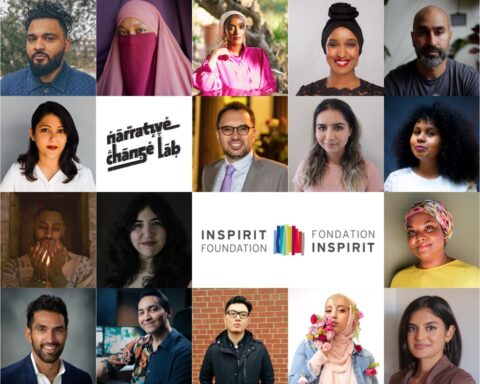Multiculturalism is under siege from all sides and has nowhere to hide: certainly not in Britain or France or Germany. It is persona non-grata even in North America. What has happened to this cherished scheme of social engineering to deserve such a fate – not unlike that of Egypt’s deposed president Hosni Mubarak?
Plainly stated, multiculturalism’s long honeymoon is over. It flourished in times of economic prosperity in the seventies, eighties and early nineties when the social and political winds were favourable. When the economic winds started to weaken and change direction, combined with the post-9/11 poison cloud, the wheels stared to fall off quickly.
To get a better perspective, ask yourself this question: What does multiculturalism and that other great Canadian invention Tim Hortons have in common? A simple order of a “double-double” at a Tim Hortons near you is all you need to know about the present troubles and dysfunctionality of multiculturalism. If you are waiting in line, for instance, the exchange of morning pleasantries and weather conditions between customers of different ethnic communities is rare. It is, rather, confined to persons of the same stripe and colour.
Moreover, if you happen to sit down inside, you will discover that the place is carved up and colonized by different groups of people talking among themselves, oblivious to the rest. This Balkanization within a Tim Hortons environment is the epitome of the present segregation dilemma facing official multiculturalism. This phenomenon is probably the same in most high schools and colleges.
Britain’s Prime Minister David Cameron said in February 2011 that, “under the doctrine of state multiculturalism we have encouraged different cultures to live separate lives, apart from each other and the mainstream.” Germany’s Chancellor and the French President have also stated that multiculturalism has failed in its stated mission and must be replaced by something yet to be formulated.
Here in Canada, the debate is being buried under the weight of political correctness and electoral calculation. In an election year, any talk about tampering with immigration numbers or multiculturalism is almost equivalent to political suicide.
But when Michael Ignatieff was still a public intellectual roaming the globe, he said the following: “A multicultural Canada is a great idea in principle, but in reality it is more like a tacit contract of mutual indifference. Communities share political and geographical space, but not necessarily religious, social or moral space. We have little Hong Kongs, little Kabuls, just as we once had little Romes or little Lisbons.”
Consider also a 2007 study by the Montreal-based Institute for Public Policy that was based on an ethnic diversity survey from Statistics Canada. The study found that only 33 per cent of first-generation, visible minority immigrants identify themselves as Canadians, compared with 64 per cent of white immigrants.
Prof. Jeffery Reitz of the University of Toronto says, “When you study the trend over time, visible minorities who were born here feel less like they belong than their parents.” Sadly, that is exactly the opposite of the goals articulated by Prime Minister Pierre Trudeau and other well-meaning intellectuals when they envisioned multiculturalism as a bedrock characteristic of Canada.
We must embark on a new definition to align with new realities, just as religion is redefining itself in a secular age. This is an urgent task for all the social engineers of statism.
Consider these ideas as a starting point:
- Every immigrant to Canada should be aware of the basic principles of a liberal democracy and the Charter of Rights and Freedoms.
- Multiculturalism has to mean one thing only: it is a transitional phase and not a destination.
- Citizenship and all it entails must be a paramount feature of any new redefinition of multiculturalism. Immigrants should be encouraged to participate in civic society by voting more often, doing charity work, community involvement, learning local sports and customs, communicating with neighbours and actively practising citizenship. As former US president Bill Clinton once said, “Take some time; make some effort to practice your citizenship.” Holding a citizenship card alone is not enough and it means nothing if it is for ornament or prestige.
- A more “muscular liberalism” – Cameron’s phrase – is needed to defend and promote the culture that created Canada in the first place, the values that attracted the immigrants to join it. It must be of some value and significance.
- Accommodation, destroying discriminatory barriers and removing prejudicial attitudes and practices are a two-way street. The old formula is still valid: “You adjust, we adapt.” Canadians should also realize that they have no monopoly on virtue, values and a way of life.
- Culture should not be our destiny. It is a way to adapt to the world. Change it when need be. Improve it when necessary. Do not let it imprison you and subjugate you. And remember one truism: Not all cultures are equal.
We need to revisit multiculturalism and fine-tune its mission and objectives for the Canada of tomorrow. It is a fact that we cannot ignore given our demographic trends and economic realities. Multiculturalism is alive in the corridors of political correctness and power in Ottawa, but not in the hearts and minds of immigrants where it really matters.
We need leaders with vision and courage to confront the complacency of everyday politicians. Where are they?
Elie M. Nasrallah is an immigration consultant in Ottawa and a commentator for major newspapers in North America and the Middle East. A graduate of Carleton University with an honours degree in political science, he recently co-authored My Arab Spring My Canada.




